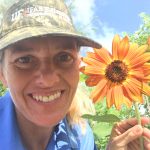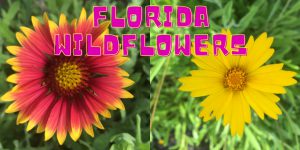Why Wildflowers?
Loss of biodiversity is one of the major threats to the world. Pollen nectar provides food for insects, which helps to pollinate our food crops, eat pests, and provide food for other wildlife. You can be part of the solution and join our workshop to receive and plant wildflowers to attract pollinators. Plant a wildflower and experience the joy of watching nature come alive in your own backyard. Wildflowers are very Florida-Friendly and support the principles “Attract Wildlife” and “Manage Pests Responsibly.” They attract pollinators and help control pests in your landscape with minimal use of water and fertilizer, helping you to create an ecological landscape that is more sustainable.

In this wildflower 3-part series, you will learn how to plant seeds and select the best species of wildflowers for your backyard (Part 1). Learn to identify wildflower species to attract bees, butterflies and beneficial insects (Part 2). Learn how to save seeds and replant for future generations (Part 3) in Feb of 2022. This educational experience will be led by Tia Silvasy, Florida-Friendly Landscaping™ agent at UF/IFAS Extension Orange County.
Part 1: Wildflower Seed Planting
Part 1 was held on Oct. 5th in person and on Oct. 7 by webinar. October is the best time to plant wildflower seeds in Central Florida. You can view the webinar recording here and complete the survey at the end to receive a free pack of seeds, while supplies last. The seed pack contains native and nonnative wildflower species including calendula, coreopsis, phlox, sweet alyssum, cosmos, zinnias, and blanketflower. Watch our YouTube short videos to learn how to plant wildflower seeds in the ground or in a container.
Part 2: Wildflower Gardening
Part 2 was held on Nov. 16th in person and on Nov. 18 by webinar. November is still a good time to plant wildflower seeds in Central Florida. This module focused on Florida native plants as they are important for supporting native insects and other creatures. We also looked at how pollinators (which are attracted by wildflowers) help to pollinate our food crops such as tomatoes, cucumbers, and squash. Watch the webinar recording here.
Part 3: Wildflower Gardening
Part 3 will be in February of 2022 when the wildflowers are in full bloom. We will have a field day and you will get to see all the species blooming and learn how to save seeds. View the recording of our field day from last years Florida wildflower trials here.
Come IN-PERSON for Part 3 of our Wildflower Gardening Workshop.
Where: Orange County Extension Center
6021 S. Conway Rd. Orlando, FL 32812
When: TBA
Cost: $10 per person
 Or join our WEBINAR on Wildflower Gardening
Or join our WEBINAR on Wildflower Gardening
When: TBA
Cost: Free, suggested donation $10
The webinar will be recorded, and the link will be shared with all registered participants to view at your leisure if you are unable to attend the webinar live or would like to watch it again.
Want to learn more? Read about Florida-Friendly Landscaping™ https://ffl.ifas.ufl.edu/. Follow us on Facebook https://www.facebook.com/GardenFlorida/ and Instagram https://www.instagram.com/oc_extension/, and visit our website https://sfyl.ifas.ufl.edu/orange/home-lawns-landscapes-and-gardens/florida-friendly-landscaping/.
 0
0
